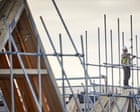Tough rules announced in the government’s immigration white paper could jeopardise the UK’s net zero mission by causing labour shortages, areport has warned.
Labour’s white paperreleased last monthincluded plans to raise the minimum qualification for skilled worker visas from A-level equivalent to degree and to maintain thehigher salary threshold of £38,700introduced by the outgoing Conservative government last year.
A report by the Centre for European Reform (CER), calculates that more than half of the foreign-born workers doing “green jobs” in the UK – 260,000 out of 465,000 – would not have been allowed in under the new rules.
Ministers are relying on employers to raise wages and provide more training in order to attract domestic workers into these roles, but John Springford, an associate fellow at the CER, said that could push up the costs to consumers of going green.
“If labour shortages raise the cost of decarbonising buildings, fewer people will insulate their homes or buy heat pumps,” he said.
Using Office for National Statistics data, the CER defined a green job as one in which more than a third of the worker’s time is spent on green tasks. Many of these are in the construction sector, given the need to retrofit homes with low-carbon technologies, for example.
The report also suggests construction jobs more generally may be difficult to fill under the new visa regime, casting doubt on the government’s target to build 1.5m homes by the end of the parliament.
“Construction is labour-intensive and has a lot of employee turnover, because the work is physical and seasonal. Given that the government’s aim is to expand housebuilding and decarbonise buildings concurrently, the sector is most at risk of labour shortages as a result of the government’s immigration proposals,” the report says.
Labour has announced that the existing “immigration salary list”, which allows people doing specific types of job to be brought in on lower pay, will be replaced with a similar “temporary shortage list”.To avoid this becoming a long-term measure, the relevant industry will be expected to set out plans to train and recruit more UK workers.
The CER said that using a shortage list as a safety valve could be problematic because the higher salary threshold elsewhere means migrants in the sectors with shortages are unlikely to be able to shift into other jobs, leaving them vulnerable to exploitation by the employer who sponsors their visa.
This problem arose in social care where holders of health and care visas weresubject to exploitationby bad employers, with little chance of moving to another post.
“The government should keep an eye on labour shortages in occupations that are crucial for its net zero and housebuilding missions, and relax visa rules if needed,” Springford said. “But offering exemptions to the rules for specific occupations is risky.”
Sign up toBusiness Today
Get set for the working day – we'll point you to all the business news and analysis you need every morning
after newsletter promotion
Other options mooted in the report include offering “green visas” for jobs that contribute to achieving the government’s target of hitting net zero by 2050, or reducing salary and skills thresholds right across the economy.
Keir Starmer announced the immigration crackdown last month,claimingit marked the end of “a squalid chapter for our politics, our economy and our country” in which the post-Brexit Conservative government had overseen soaring migration.
Net migration hit a record level above 900,000 in the year to June 2023 before dropping sharply after a series of changes made by Rishi Sunak’s government, including tightening the rules for visa applicants to bring in dependents. In the 2024 calendar year net migration was 431,000.
Starmer said net migrationwould fall “significantly”as a result of the changes he has announced.
As well as potentially causing labour shortages in key sectors, economists have said lower net migration could prompt the independent Office for Budget Responsibility to downgrade its growth forecasts.
The government has been approached for comment.
